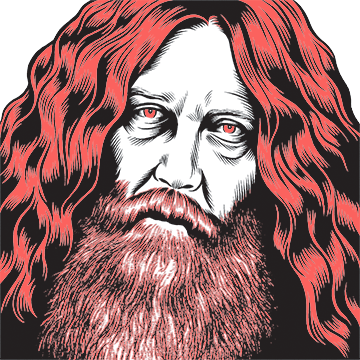It was no easy feat getting in touch with Alan Moore. For a man who’s not afraid to speak his mind, he doesn’t like publicity. But when you get him talking, he has much to say. Moore is one of the most influential living comic-book writers, and his work has defined modern superhero comics in ways that are so enfolded into the industry that it’s hard to parse them anymore. For over thirty years he has put out a continuous stream of comics, from superheroes to Jack the Ripper to erotica. Moore’s reimagining of Swamp Thing in the early 1980s made horror comics their own industry just when publishers had all but given up on a comic subgenre that had once been the cause of the now much-belied Comics Code. His 1986–87 comic Watchmen demythologized superheroes by stripping them of their godlike glamor and morality and showing how damaging and complicated power really is. Moore has also watched as his creations have been torn asunder by the very industry he helped transform. His much-loved comic book The League of Extraordinary Gentlemen is a wonder of pulp, fantasy, intrigue, and politics, but once the movie studios got their hands on the property, it was turned into an example of how not to adapt a comic book.
But Moore, at least by all indications, has put all that behind him, particularly his very public falling-out with DC Comics. He has sworn off the mainstream comic-book publishers, writing only for smaller, independent companies. His output is still prolific. In 2009, Moore started publishing and editing Dodgem Logic, an underground magazine with many of the contributions from locals of his hometown of Northampton, England. He is currently working on Jerusalem, a novel expected to be over five hundred thousand words long, a twelve-issue comic series about H. P. Lovecraft for Avatar Comics, and another tale in the ongoing League of Extraordinary Gentlemen series. Moore’s comics are not merely fanciful creations but alchemical diagrams that reveal the secrets of his unconscious. Moore believes magic is a grammar—a linguistic, symbolic structure for looking at the world. He has at times described interactions with gods and demons; he insists these entities are not real in the phenomenal sense. They are ideas, but they contain all the power of these gods as if they were real. Moore believes that art and magic are aspects of the same part of human consciousness: the will to create. Magic, for Moore, is not about the material world but the world of the mind. Its only authentic external expression is art. This interview took place by phone.
—Peter Bebergal
I. THE...
You have reached your article limit
Sign up for a digital subscription and continue reading all new issues, plus our entire archives, for just $1.50/month.
Already a subscriber? Sign in





